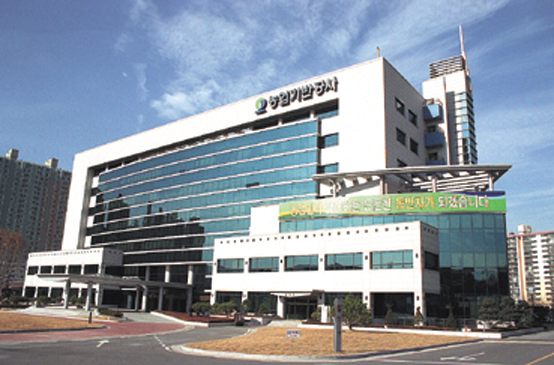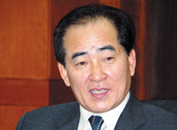How to Invigorate
Rural Community?
- KARICO pursues reforms with new determination and reorganization

 Korea Agricultural & Rural Infrastructure Corp. (KARICO) has undergone tremendous reforms to cope with agricultural environment changes amid limited competition. The corporation has declared the year 2005 as the first year of its second foundation with a mission of invigorating the agricultural areas.
Korea Agricultural & Rural Infrastructure Corp. (KARICO) has undergone tremendous reforms to cope with agricultural environment changes amid limited competition. The corporation has declared the year 2005 as the first year of its second foundation with a mission of invigorating the agricultural areas.
Ahn Jong-wun, KARICO president, now one year in office, has initiated a far-reaching reform measures, including reorganization,
Ahn is still optimistic about the prospects of the agricultural community and farming. "If they make a new start with the spirit of challenges, I believe that our farming sector could join the ranks of advanced farming countries," he said. The following are the excerpts of his interview with Newsworld.
Q: February marks the first anniversary of your inauguration as KARICO president. What achievements have you made so far?
A: The achievements our corporation has made in the past one year have been summed up as follows. They are the reestablishment of the corporation's projects and functions; in-house innovative reform; its transformation as a clean public corporation through harmony and ethics management; and establishment of business foundation based on profitability and public interests.
Our corporation's projects and functions have been streamlined by setting comprehensive rural community development projects as its core business arena in a bid to meet agricultural environmental changes. The reorganization of the corporation was carried out last December in accordance with a reform plan, arranged by the commissioned Samsung Economic Research Institute. A process of overhauling related laws is under way.
Under the organizational reform plan, a team-based system has been introduced to beef up its organizational competitiveness in an era of unlimited competition. The plan also calls for appointing executive directors and chiefs of district offices though public recruiting system and fostering human resources.
Last July, KARICO inked an experimental agreement on ensuring ethics management. The corporation has made strenuous efforts to make itself as corruption-free public corporation by implementing such steps as the establishment of an anticorruption organization and introduction of an Internet-based electronic bidding system on contracts worth more than 10 to 20 million won.
KARICO has built up coexistence relations between labor and management.
Lastly, the corporation has focused on solidifying a business foundation based on profitability and public interests. Taking an instance, operation of eight exemplary district offices and establishment of an informatization network for farmers specializing in rice farming, and introduction of performance assessment and management responsibility systems.
Q: KARICO ranked high in the 2004 National Costumer Satisfaction Index (NCSI), conducted by the Ministry of Planning and Budget. With regards to this, could you comment on this year's plan?
A: Our corporation's policy of attaching top management priority on customer satisfaction has paid off: KARICO placing second and third in the 2003 and 2004 NCSI rankings among public corporations, respectively.
In an effort to offer better services to customers during 2005, the corporation has operated a mobile customer center since January. It is aimed at helping field managers visit each village and hear complaints and grievances for revamping.
KARICO plans to arrange such diverse institutional systems through farmers' active participations as the free distribution of standard design drawings of houses for fishing and farming communities. The service can be offered free of charge by calling 1588-1504 from any place.
Q: Would you give the details of your declaration of the year 2005 as the first year of the so-called Second Foundation of KARICO?
A: The public outcry has mounted for restructuring the agriculture industry as farming and fishing communities are increasingly laden with difficulties in the wake of acceleration of the opening of the agro-fishery markets. The central government came up with a package of comprehensive steps to cope with such woes in February last year.
Responding to such agricultural environment changes, the corporation has also undergone extensive changes in its functions and organizational operations by shifting its focus on agricultural production infrastructure improvement projects into comprehensive agricultural area development projects.
KARICO has so far covered 1.13 million hectares of paddy fields, accounting for 11 percent of the nation's territory measuring 9.96 million hectares. But from now on, the corporation will handle 8.5 million hectares, 85 percent of the total agro-fishery areas, as well as 1.85 million hectares of paddy and other fields, a 11 percent portion.
The corporation plans to comprehensively improve environmental conditions of agro-fishery areas in a bid to ensure competitiveness and balanced development between urban and rural communities, while carrying out new projects, including farmland banks.
Teams have been formed up to perform the changed functions, and an executive director and an allotted number of 10 first-grade officers have been axed according to the reorganization. The head office has shed 206 officials, 23 percent of its workforce, and has transferred them all to district, field offices.
KARICO wants to consider the year 2005 as the first year of its second foundation as the scope of its reform has expanded to the planned change of the name of the corporation.
Q: Would you introduce farmland banks the corporation will take charge from the second half of this year?
A: Firstly, farmland banks will be charge of purchasing farmland from farmers suffering from debts stemming from firming. Farmers will be allowed to farm on their farmland as tenants until repurchasing it when they are engaged in stabilized farming.
Secondly, farmland banks will purchase farmland from urbanites and lease the land to professional rice growers, while they will be entrusted with transactions of farmland possessed by farmers.
Thirdly, they will be discharged with purchasing and stockholding farmland in a bid to stabilize the farmland market, helping elderly farmers quit farming by purchasing their land and fostering large-scale concerns through acquisition of reclaimed coastal farming areas.
Q: Could you elaborate on agricultural area development projects KARICO will implement newly?
A: KARICO is pushing such projects as comprehensive agricultural area development projects, theme clusters, and senior complexes in a bid to promote balanced development and invigorate rural communities by attracting human resources and capital from urban areas.
The comprehensive agricultural area development projects will be carried out by zoning villages in the same living sphere into three - landscape improvement, living condition improvement and facilities for earning profits. A master plan on 36 spheres was established in 2004 with planned completion scheduled for the second half of the year. During 2005, the corporation plan to conduct a feasibility study and work out a master plan on 40 new spheres.
KARICO will put into high gear projects to improve houses in agricultural areas in dual purposes of boosting the income of farming households and help urbanites possess comfortable living quarters.
Q: Please summarize KARICO's vision, and mid- and long-term strategies?
A: KARICO has a vision of becoming a global public corporation creating the new values of the agricultural industry and rural community. We have drawn up a mid- and long-term strategy to realize this vision. The corporation aims to post annual sales to 3 trillion and reach the break-even point in operating profits by 2009.
To this end, the corporation plans to push four key strategies - expansion of new growth engines, reforming management systems, fortifying core capabilities, and customer confidence buildup воиг and about 100 detailed action plans.
Q: What's your philosophy?
A: I believe in firm philosophy "when considered to be late, it is running fastest." The people tend to give up a job before launching it, because they think it is too late, but I understand you could have an opportunity when you think it is too late.
I entered the university late due to difficulties, and began may public servant career later than others after starting to take higher administrative examination tests late, and I've always challenged new things when others think it is too late and managed to make it. I now disagrees with the views of many people our agricultural community and farming are too late. If they make a new start with the spirit of challenges, I believe that our farming sector could join the ranks of advanced farming countries. nw
3Fl, 292-47, Shindang 6-dong, Chung-gu, Seoul, Korea 100-456
Tel : 82-2-2235-6114 / Fax : 82-2-2235-0799